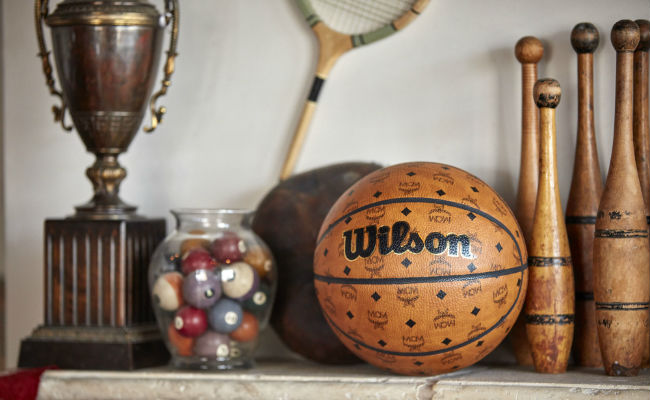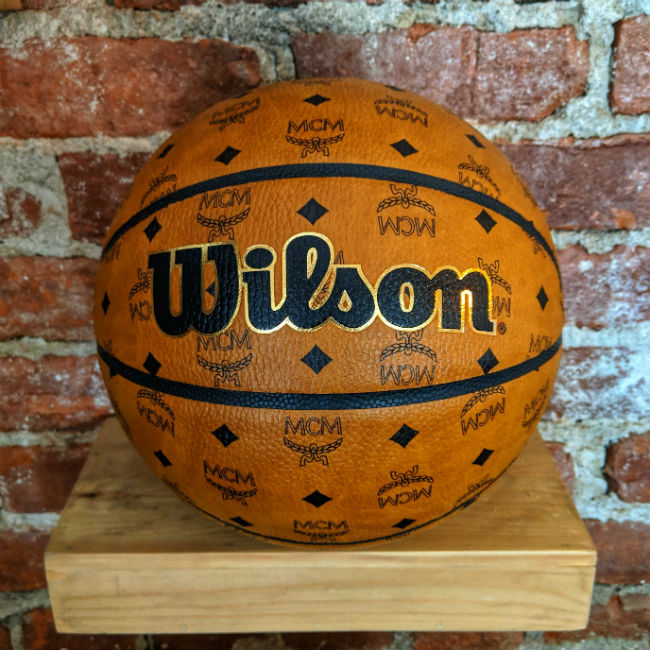
On the first nice day of spring it feels like everyone wants to grab a basketball and shoot some hoops. At least it felt like that in Boston — the thermostat went above 60 degrees outside in early April and, for the first time in months, I saw a basketball somewhere other than on the TD Garden parquet.
The parks were full, pickup games in full bloom. A walk through Downtown Crossing saw teens dribbling on the brick pedestrian walkway, fighting over who got to chip the rust off their handles in the crisp air. Later on I saw a father and son at the Fenway Target carrying an indoor/outdoor Spalding ball, the latter looking eager to get some runs in while the day still had light.
Owning a basketball carries some significant playground currency, and that’s not changing anytime soon. But the sporting goods industry is also targeting a different kind of status, something that puts them in more than just community center gyms and park blacktop but display cases and memorabilia shelves. And a lot of these products aren’t even designed to play with at all. Companies like Spalding and Wilson are building partnerships with luxury brands to make their spheres and spheroids into powerful symbols of something very different than your favorite ball growing up.

We recommend proudly displaying your new ball, as it has not been designed for recreational use.
That’s the final sentence on the placard that comes with a Wilson basketball made in collaboration with MCM, the luxury leather goods manufacturer. The ball was featured in a pop-up at Nordstrom’s in 2018 and retails for $280. That’s a pretty steep price for a ball you can’t even play basketball with, but according to Wilson it’s an important and growing part of what the sporting goods manufacturer does with its products.
“The company was built and focused on these really highly innovative products. This is the flip side to that,” Amanda Lamb, marketing director at Wilson told Uproxx. “We get to showcase what our production capabilities really are through a whole new lens.”
Lamb said a partnership with MCM showcases Wilson “through a different canvas,” which is why they agreed to produce a basketball and football with the company when MCM approached them. And they’d worked with other popular streetwear companies to make limited run products in other categories.
“We did a collaboration with BAPE — they did a tennis ball series with Supreme,” Lamb said. “So as we look to make our sports categories more relevant to our players, this lifestyle side of the game is really interesting territory for us.”
The concept of a luxury basketball might be strange to those just looking for something to shoot through a hoop, but it’s not exactly a new market. Buying an authentic game ball would be a luxury for most — an official NBA game ball will cost you $170 on Spalding’s website, a hefty chunk of change for something most would scuff up on a playground in a hurry. But the luxury market is booming when it comes to sporting goods, and companies are eager to partner with niche brands to gain new attention in the marketplace. Spalding is making its own moves in the market as well. The company started a 94 Series that included collaborations with Just Don — the streetwear brand that’s collaborated with Nike’s Jordan Brand — and BAPE in 2018. BAPE, or A Bathing Ape, is a Japanese streetwear company that’s collaborated with everyone from adidas to Disney and, yes, Spalding and Wilson.
“It’s kind of taken over the sporting goods industry,” said Nigel Snipes, Spalding’s product marketing manager of the 94 Series, of collaboration.
Snipes spoke to an effort from these companies to connect with athletes and fans in a way that taps into the culture of basketball more than its fundamentals. If the idea fits basketball culture and the partner is right, he said Spalding is up for anything.
“When you look at basketball specifically, it’s at the intersection of culture, fashion and music. It’s all there together. and they work together to create something beautiful,” Snipes said. “I think it’s important to stay within that culture and to be a part of it. It is what helps make basketball what it is today.”
Snipes wants the 94 Series to be a mix of art and traditional balls you can actually take to a court. The latest in the series, for example, paid tribute to Kobe Bryant with an all-black ball with a rubber finish meant to mimic black mamba snakeskin. The ball went on sale in mid April and was sold out before it was released to the public. Some members of the company’s MVP membership club even missed out on snagging the $125 indoor-only ball.
“There’s a lot of different ways you can use the ball as a canvas and create a different kind of art that has value to the fans other than a basketball you shoot with,” Snipes said.
It might be odd to imagine the companies responsible for nearly every orange and black basketball ever made to work with luxury brands, but the feelings of attraction are mutual. Streetwear companies and smaller niche sports brands are certainly eager to line up with bigger manufacturers.
“We’re always looking to try to push the limits,” Chinatown Market founder Mike Cherman said. The streetwear company — which often mimics the logos of other major brands like Nike, McDonald’s and more — has collaborated with some of the brands it riffs on, including a pop up shop at Converse headquarters in Brooklyn last fall where they helped make customized Chuck Taylors.
“The reality for us is that it’s less about the brand becoming popular and more about the idea flourishing and becoming big,” Cherman told Uproxx. “If that can happen, then we’ve succeeded.”
Cherman believes bigger brands are collaborating with companies like Chinatown Market in an effort to “feel authentic” to a savvier consumer.
“These brands have to come down to our level to be able to play this game,” he said. “When you’re a massive, billion-dollar company like Nike or Converse it’s really hard to get down there naturally. So working with smaller people allows us to access to these larger projects and allows them to have a smaller voice, which in a way helps them reach a larger audience.”
Chinatown Market has seen its own star rise as a result, too. And its expanded into higher end sporting goods as well. The company’s website sells Smiley basketballs, footballs and even a $25 tube of tennis balls. I even saw the $59 bright yellow Smiley basketball at the Urban Outfitters in Faneuil Hall in Boston next to an all-black Spalding before the weather broke.
Not that the temperature outside would matter all that much. The box said the Chinatown Market ball was “durable for players of all levels” but designed for indoor use, only.






